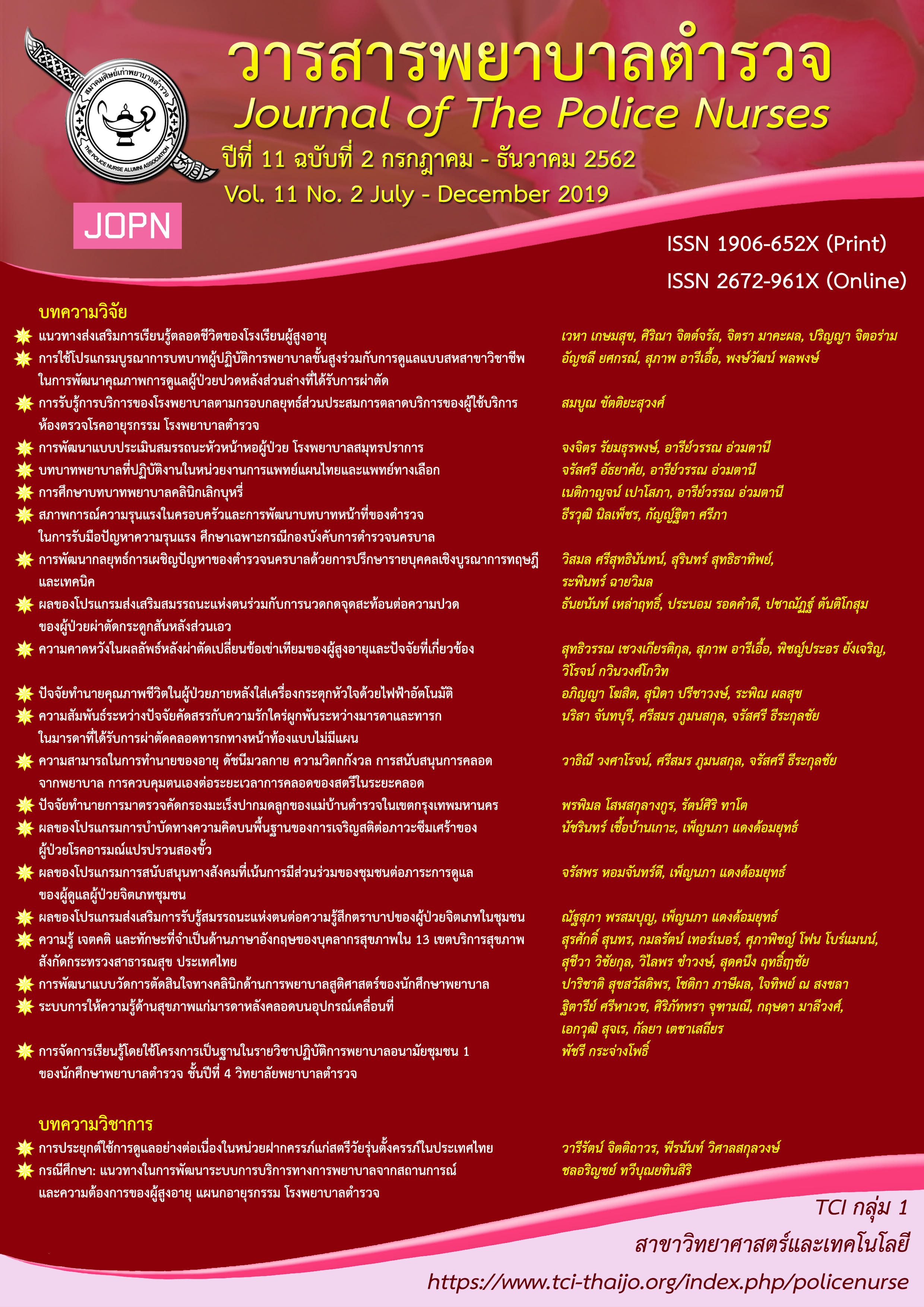RELATIONSHIPS BETWEEN SELECTED FACTORS AND MATERNAL–INFANT ATTACHMENT OF UNPLANNED CESAREAN SECTION MOTHERS
Keywords:
maternal-infant attachment, unplanned cesarean sectionAbstract
This study was a descriptive research designed to explore the correlations between selected factors and maternal-infant attachment of mothers who received unplanned cesarean sections using the maternal-infant attachment theory of Klaus & Kennel (Klaus & Kennell, 1982) as the conceptual framework. The subjects were composed of 100 mothers who had undergone unplanned cesarean sections and had postpartum recovery care at the Obstetrics-Gynecology patient ward in Police General Hospital from September 2016 – January 2017. The subjects were purposively recruited based on inclusion criteria. Data collection instruments consisted of the demographic data questionnaire, the perceived childbirth experience questionnaire, the nurses’ labor support scale and maternal attachment inventory (MAI). Data were analyzed using descriptive statistics and Pearson’s product moment correlation coefficient.
According to the findings, the factors that correlated to maternal-infant attachment in the mothers who had undergone unplanned cesarean section were perceived childbirth experience and nursing support during labor with statistical significance (r=.36, p=.000 and r=.21, p=.034, respectively). Based on the findings of this study, nurses should assess perceived childbirth experience and provide nursing support for women in labor meeting professional standards to promote maternal-infant attachment.
Downloads
References
Cunningham, F. G., Leveno, K. J., Bloom, S. L., Spong, C. Y., Dashe, J. S., Hoffman, B. L., & Casey, B. M. (2014). Williams obstetrics (24th ed.). New York, NY: McGraw-Hill.
Cohen, J. (1988). Statistical power analysis for the behavioral science (2nd ed.). New York, NY: Lawrence Erlbaum Associates.
Darvill, R., Skirton, H., & Farrand, P. (2010). Psychological factors that impact on women's experiences of first -time motherhood: A qualitative study of the transition. Midwifery, 26(3), 357-366.
Diniz, E., Volling, B. L., & Koller, S. H. (2014). Social support moderates association between depression and maternal–fetal attachment among pregnant Brazilian adolescents. Journal of Reproductive and Infant Psychology, 32(4), 400-411.
Fenwick, J., Gamble, J., & Mawson, J. (2003). Women's experiences of caesarean section and vaginal birth after caesarian: A birthrites initiative. International Journal of Nursing Practice, 9(1), 10-17.
Gibbons, L., Belizán, J. M., Lauer, J. A., Betrán, A. P., Merialdi, M., & Althabe, F. (2010). The global numbers and costs of additionally needed and unnecessary caesarean sections performed per year: Overuse as a barrier to universal coverage. World health report, 30, 1-31.
Ghadery-Sefat, A., Abdeyazdan, Z., Badiee, Z., & Zargham-Boroujeni, A. (2016). Relationship between parent–infant attachment and parental satisfaction with supportive nursing care. Iranian journal of nursing and midwifery research, 21(1), 71-76.
Guittier, M. J., Cedraschi, C., Jamei, N., Boulvain, M., & Guillemin, F. (2014). Impact of mode of delivery on the birth experience in first-time mothers: A qualitative study. BioMed Central of Pregnancy and Childbirth, 14(1), 254.
Jongpranee, P. (1997). Selected factors, social support and maternal newborn attachment in adolescent mothers (Unpublished master’s thesis, Master of Nursing Science). Graduate School, Mahidol University, Nakhon Pathom.
Kaewboonruang, N. (2001). The relationship between selected factors, self-esteem and maternal-fetal attachment of pregnant women (Unpublished master’s thesis, Master of Nursing Science). Graduate School, Mahidol University, Nakhon Pathom.
Kitamura, T., Takegata, M., Haruna, M., Yoshida, K., Yamashita, H., Murakami, M., & Goto, Y. (2015). The mother-infant bonding scale: Factor structure and psychosocial correlates of parental bonding disorders in Japan. Journal of Child and Family Studies, 24(2), 393-401.
Klaus, M. H., & Kennell, J. H. (1982). Parent-infant bonding (2nd ed.). St. Louis: The C.V. Mosby.
Kwon, M. K., & Bang, K. S. (2011). Relationship of prenatal stress and depression to maternal-fetal attachment and fetal growth. Journal of Korean Academy of Nursing, 41(2), 276-283.
Marut, J. S., & Mercer, R. T. (1979). Comparison of primiparas' perceptions of vaginal and cesarean births. Nursing Research, 28(5), 260-265.
Müller, M. E. (1996). Prenatal and postnatal attachment: A modest correlation. Journal of Obstetric, Gynecologic, & Neonatal Nursing, 25(2), 161-166.
Nilsson, L., Thorsell, T., Hertfelt Wahn, E., & Ekstrom, A. (2013). Factors influencing positive birth experiences of first-time mothers. Nursing Research and Practice, 2013, 1–6.
Phanthufak, M., Phumonsakul, S., & Chareonpol, O. (2010). The effect of a maternal role promoting program on maternal-infant attachment, maternal role satisfaction, competency in infant behavioral learning and infant growth. Ramathibodi Nursing Journal, 15(2), 149-161.
Phumonsakul, S., Suksanguan, P., & Khanobdee, C. (2016). Development of the labor support scale for intrapartum nurse. Ramathibodi Nursing Journal, 22(3), 247-262.
Pookboonmee, R. (1988). Relationships between birth experience and maternal newborn bonding as perceived by planned and unplanned caesarean section mothers (Unpublished master’s thesis, Master of Education). Graduate School, Chulalongkorn University, Bangkok.
Roux, S. L., & Van Rensburg, E. (2011). South African mothers' perceptions and experiences of an unplanned caesarean section. Journal of Psychology in Africa, 21(3), 429-438.
Serisathien, Y. (1987). The relationships between perception of childbirth experience, self-concept and maternal newborn attachment in high risk mothers (Unpublished master’s thesis, Master of Nursing Science). Graduate School, Mahidol University, Nakhon Pathom.
Soet, J. E., Brack, G. A., & DiIorio, C. (2003). Prevalence and predictors of women's experience of psychological trauma during childbirth. Birth, 30(1), 36-46.
van Reenen, S. L., & van Rensburg, E. (2013). The influence of an unplanned caesarean section on initial mother-infant bonding: Mothers' subjective experiences. Journal of Psychology in Africa, 23(2), 269-274.
World Health Organization (WHO). (2015). World health statistics 2015. World Health Organization.
Yarcheski, A., Mahon, N. E., Yarcheski, T. J., Hanks, M. M., & Cannella, B. L. (2009). A meta-analytic study of predictors of maternal-fetal attachment. International Journal of Nursing Studies, 46(5), 708-715.
Downloads
Published
How to Cite
Issue
Section
License
ผลงานที่ได้ตีพิมพ์แล้วจะเป็นลิขสิทธิ์ของวารสารพยาบาลตำรวจ















